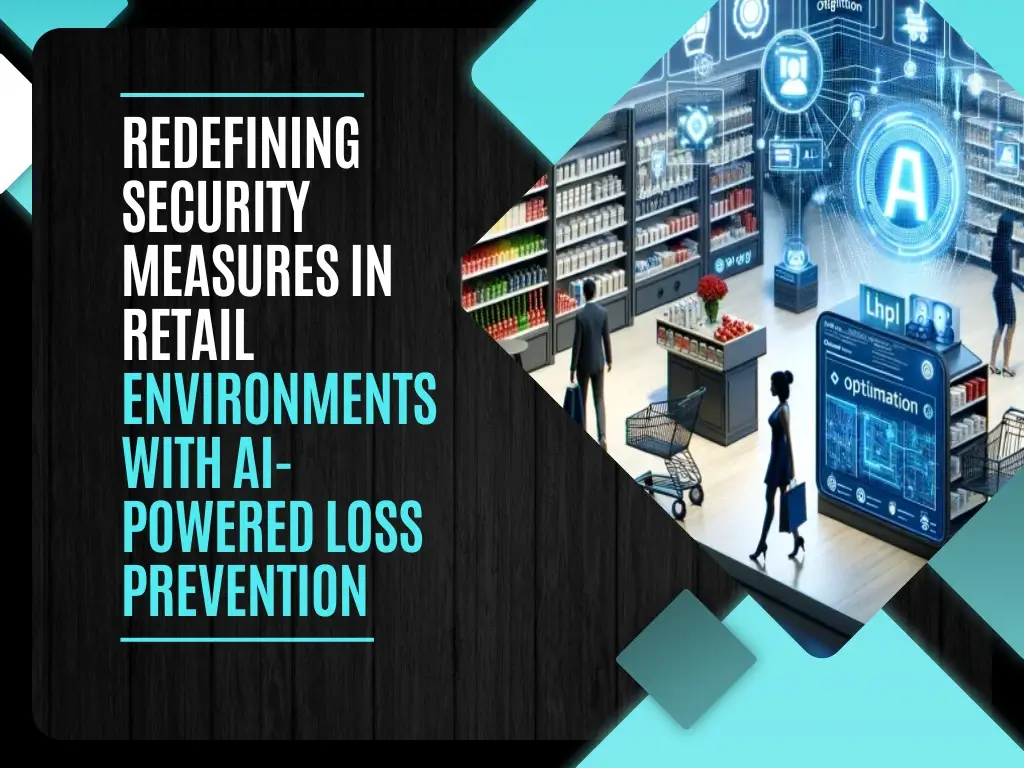Redefining Security Measures in Retail Environments with AI-Powered Loss Prevention
Enhance retail security with AI-driven loss prevention, reducing theft and fraud while improving efficiency and customer experience.

In an era where retail transactions are shifting online, ensuring security measures is paramount for businesses. As technology evolves, so do the methods of retailers and malicious actors.
Traditionally, security measures focused primarily on physical aspects, leaving the opportunity for cyber threats to grow in numbers. This prompted the introduction of AI for retail security, heralding a new era of adaptive and proactive defense mechanisms. Here, artificial intelligence emerges as a powerful tool, offering innovative solutions to bolster all kinds of retail security.
However, it is important to examine AI in retail security, exploring its potential, challenges, and implications. Almost 85% of cybersecurity leaders have indicated that AI is the potential reason for the recent cyberattacks.
Understanding the nuances of AI capabilities in the context of retail security requires a balanced and vendor-neutral perspective.
Transformation of Retail Security: How AI is Reshaping the Game
Retail security was indeed relied upon by manual efforts for decades. While these methods were able to defer theft to some extent, they always lacked finesse and couldn’t adapt to the evolving technologies.
This is where AI for retail comes into place. AI can empower retail transformation services with proactive defense mechanisms, fundamentally shifting the security paradigm.
Here’s how:
1. Intelligent Video Analytics
AI-enabled video analytics systems can do more than just capture images. By examining live video feeds, they can spot suspicious activity like hanging around expensive goods, hiding goods, or tampering with security tags. This minimizes losses by enabling security officers to take preventive measures.
2. Predictive Analytics
AI can analyze past theft data, including the time of day, the targeted objects, and even the meteorological conditions. Retailers can make use of these data to predict the susceptible areas and time of theft and allocate extra security resources. Security staff efficacy is increased by concentrating them on high-risk areas during hours when theft is most likely to occur.
3. Facial Recognition
AI-powered facial recognition can recognize known shoplifters from available databases, but it is an ethically difficult process to implement that needs clear restrictions. While technology doesn’t take the place of interpersonal communication, it does let security staff keep an eye on these people and covertly interfere when needed. In this application, maintaining transparency and appropriate data use is crucial.
As retailers adopt these advanced technologies, aligning implementation with ethical standards and operational goals becomes essential. That is where reaching out to an experienced AI development company can ensure tailored, secure, and scalable solutions that genuinely meet the nuanced demands of retail security.
The Tangible Benefits of AI for Retail Security
AI-powered retail transformation services can benefit retailers in multiple ways. These innovative solutions can increase safety protocols, enhance productivity, and provide useful insights that could benefit retailers.
Here’s how the retail industry is being transformed with AI solutions:
1. Reduced Losses
Advanced analytics and proactive monitoring eventually minimize theft and shoplifting losses. AI in retail can recognize questionable activity instantly, enabling prompt response. This directly contributes to a healthy bottom line by preventing potential theft and discouraging such incidences in the future.
2. Improved Efficiency
AI can streamline security operations by automating the analysis of video and other data sources. As a result, security personnel can focus on real risks rather than tediously watching hours worth of footage. This optimized resource allocation improves operational effectiveness by enabling security teams to respond to situations with greater speed and accuracy.
3. Enhanced Safety
Through constant risk detection, AI in retail can ensure a safer workplace for employees and customers. This entails spotting potentially dangerous situations, spotting hostile conduct, and making sure safety procedures are followed. The result is a safer purchasing environment that builds client loyalty and improves the brand’s standing.
4. Data-Driven Decision Making
Retailers can decide on budget allocation and security tactics with knowledge, thanks to AI for retail security. AI examines patterns from previous data and assists merchants in understanding where and when they are most vulnerable to security threats. This knowledge enables businesses to proactively modify their security procedures and enhance overall safety.
5. Cost Optimization
Retailers can save a lot of money by incorporating AI-powered retail transformation services in their security systems. Automated technologies save labor expenses associated with traditional security approaches by eliminating the need for intensive human monitoring. Additionally, AI makes a security approach more cost-effective by reducing theft losses and increasing operational effectiveness. The company can increase overall growth and competitiveness by reinvesting these savings in other business divisions.
Bottom Line
AI’s incorporation into retail transformation services is a critical evolution in the protection of digital and physical assets. AI uses careful facial recognition, predictive analytics, and sophisticated video analytics to offer an efficient defense against new security threats.
AI for retail can reduce potential threats and help them to make informed decisions. AI can improve the entire security framework of retailers and provide reliable as well as safe experiences to customers.
This is how retail transformation services are creating a revolution. Although evolving threats are beyond the reach of conventional security measures, AI solutions can promise to increase productivity while making employers, employees, and customers feel safe.



